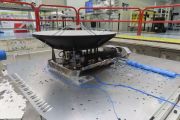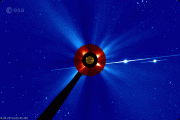
Copernical Team
Before we build on the moon, we have to master the commute
Verifying that you are not a bot
The moon and sun figure big in the new year's lineup of cosmic wonders
Verifying that you are not a bot
Engineered interlayers boost satellite insulation and flexible electronics
 Researchers at Empa are refining the multilayer insulation foils that wrap many satellites and space probes, aiming to improve their mechanical robustness while maintaining thermal protection. These foils, known as multilayer insulation or superinsulation, are built from stacked layers of a strong polymer coated with thin metal, typically aluminum, and are also used on Earth in items such as sur
Researchers at Empa are refining the multilayer insulation foils that wrap many satellites and space probes, aiming to improve their mechanical robustness while maintaining thermal protection. These foils, known as multilayer insulation or superinsulation, are built from stacked layers of a strong polymer coated with thin metal, typically aluminum, and are also used on Earth in items such as sur Japan's flagship H3 rocket fails to launch satellite
 Japan's flagship H3 rocket failed to launch a geolocation satellite into orbit on Monday due to engine failure, the country's space agency said.
The second-stage engine "terminated prematurely" after the rocket blasted off at 10:51 am (0151 GMT) from the Tanegashima space centre in southern Japan, according to the Japan Aerospace Exploration Agency (JAXA).
It could not release into orbit
Japan's flagship H3 rocket failed to launch a geolocation satellite into orbit on Monday due to engine failure, the country's space agency said.
The second-stage engine "terminated prematurely" after the rocket blasted off at 10:51 am (0151 GMT) from the Tanegashima space centre in southern Japan, according to the Japan Aerospace Exploration Agency (JAXA).
It could not release into orbit Conventional photon entanglement reveals thousands of hidden topologies in high dimensions
 Researchers at the University of the Witwatersrand in South Africa, working with Huzhou University in China, have shown that a standard source of entangled photons used in quantum optics carries a rich set of hidden topological structures in high dimensions. They report entanglement across 48 dimensions with more than 17 000 distinct topological signatures, providing a large alphabet for encodin
Researchers at the University of the Witwatersrand in South Africa, working with Huzhou University in China, have shown that a standard source of entangled photons used in quantum optics carries a rich set of hidden topological structures in high dimensions. They report entanglement across 48 dimensions with more than 17 000 distinct topological signatures, providing a large alphabet for encodin Hubble pinpoints asteroid smash ups in nearby Fomalhaut system
 In a historical milestone, catastrophic collisions in a nearby planetary system were witnessed for the first time by astronomers using the NASA/ESA Hubble Space Telescope. As they observed the bright star Fomalhaut, the scientists saw the impact of massive objects around the star. The Fomalhaut system appears to be in a dynamical upheaval, similar to what our solar system experienced in its firs
In a historical milestone, catastrophic collisions in a nearby planetary system were witnessed for the first time by astronomers using the NASA/ESA Hubble Space Telescope. As they observed the bright star Fomalhaut, the scientists saw the impact of massive objects around the star. The Fomalhaut system appears to be in a dynamical upheaval, similar to what our solar system experienced in its firs Webb maps carbon rich atmosphere on distorted pulsar planet
 Scientists using NASA's James Webb Space Telescope have identified an exoplanet with an atmosphere unlike any seen before, orbiting a rapidly spinning neutron star known as a pulsar. The object, officially designated PSR J2322-2650b, has a mass comparable to Jupiter but is stretched into a lemon-like shape by the strong gravitational pull of its compact host star. Its atmosphere appears dominate
Scientists using NASA's James Webb Space Telescope have identified an exoplanet with an atmosphere unlike any seen before, orbiting a rapidly spinning neutron star known as a pulsar. The object, officially designated PSR J2322-2650b, has a mass comparable to Jupiter but is stretched into a lemon-like shape by the strong gravitational pull of its compact host star. Its atmosphere appears dominate CoDICE instrument returns first-light particle data for IMAP mission
 December 16, 2025 - Southwest Research Institute's Compact Dual Ion Composition Experiment (CoDICE) instrument aboard NASA's Interstellar Mapping and Acceleration Probe (IMAP) spacecraft has begun returning first-light particle measurements. IMAP launched in September to help researchers better understand the boundary of the heliosphere, the magnetic bubble that surrounds and protects our solar
December 16, 2025 - Southwest Research Institute's Compact Dual Ion Composition Experiment (CoDICE) instrument aboard NASA's Interstellar Mapping and Acceleration Probe (IMAP) spacecraft has begun returning first-light particle measurements. IMAP launched in September to help researchers better understand the boundary of the heliosphere, the magnetic bubble that surrounds and protects our solar SPHEREx completes first full sky infrared map of the cosmos
 Launched in March 2025, NASA's SPHEREx space telescope has completed its first infrared map of the entire sky, capturing data in 102 distinct wavelengths that are invisible to human eyes but common throughout the cosmos.
SPHEREx, which stands for Spectro-Photometer for the History of the Universe, Epoch of Reionization, and Ices Explorer, surveys the sky from Earth orbit about 14.5 times p
Launched in March 2025, NASA's SPHEREx space telescope has completed its first infrared map of the entire sky, capturing data in 102 distinct wavelengths that are invisible to human eyes but common throughout the cosmos.
SPHEREx, which stands for Spectro-Photometer for the History of the Universe, Epoch of Reionization, and Ices Explorer, surveys the sky from Earth orbit about 14.5 times p Starlight falls short in giant star wind power
 Astronomers report that starlight acting on stardust around the red giant star R Doradus cannot by itself power the strong stellar winds that spread key elements for life across the galaxy.
For decades, models of red giant winds have assumed that radiation pressure on newly formed dust grains is the main driver of mass loss in these evolved stars, which enrich interstellar space with carbo
Astronomers report that starlight acting on stardust around the red giant star R Doradus cannot by itself power the strong stellar winds that spread key elements for life across the galaxy.
For decades, models of red giant winds have assumed that radiation pressure on newly formed dust grains is the main driver of mass loss in these evolved stars, which enrich interstellar space with carbo 



































